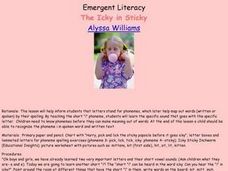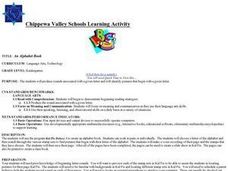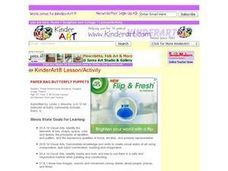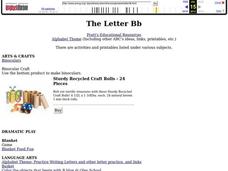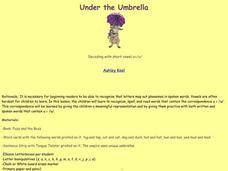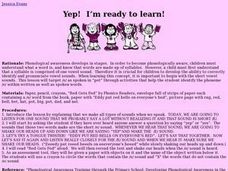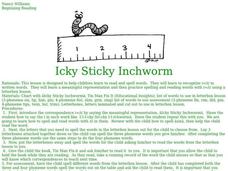Curated OER
Icky Sticky
First graders the /i/ sound by practicing the way the mouth moves while making the sound while saying "icky, sticky." They write the letter "i" using both upper and lower case letters, make words using letterboxes, and write about a...
Curated OER
The Icky in Sticky
Students study the /i/ sound by listening to it in words and a tongue twister which they later recite. Next, they practice writing the letter and making word using letterboxes. They listen to 'Icky Sticky Inchworm' while placing their...
Curated OER
The Icky Sticky Indian
Students study the /i/ sound in both written and spoken words. They examine how their mouths move as they make the /i/ sound, recite a tongue twister, and write the both the upper and lower case 'i'. Next, they listen to a story while...
Curated OER
Loving Letter "L"
Students identify the grapheme and phoneme for L. They practice writing the letter L and through listening activities, discriminate the phoneme /l/. They associate the phoneme /l/ with its letter representation and identify it in various...
Curated OER
An Alphabet Book
Students demonstrate beginning reading strategies. In this letter recognition lesson plan, students produce sounds associated with given letters and identify pictures that begin with given letters using "Kid's Pix Deluxe 3".
Curated OER
Reintroduce an Irregular Word
Some words are tricky. Can your scholars quickly recognize irregularly spelled words? Write the word was on the board (or any irregular word you'd like to practice), touching each letter as scholars segment the phonemes....
Curated OER
Animated Alphabet
Students explore English by completing an interactive language history activity. In this word recognition lesson, students discuss word formations and the phonetic relationship between letters. Students identify the origin of individual...
Curated OER
Language Arts: Scavenger Word Hunt
Participate in a scavenger hunt to find objects beginning with a particular letter sound and take digital photos of them with your scholars. Using software, they find word pictures beginning with particular letters and locate picture...
Curated OER
Paper Bag Butterfly Puppets
Whether you're using it to tell stories, explore the letter b, or during a life science lesson, these butterfly puppets will be a hit. Youngsters use crayons, tissue paper, and paper bags to create butterfly puppets.
Curated OER
The Letter Bb
Students participate in a variety of activities to practice words with the Bb sound. In this Bb sound lesson, students use craft rolls to create butterflies. Students create a letter book with B words
Curated OER
Ehhhh?
Are your kindergarten learners working with the letter e and the sounds that is makes? They'll practice writing a capital e, hear the /e/ sound in a funny tongue twister, and then identify when the teacher is saying a word that uses...
Curated OER
Mmm, Mmm ... Good!
Help primary students learn the /m/ sound. As they listen as the teacher introduces the "Secret Code" of language they will practice the /m/ sound by rubbing their tummies as if eating something good. They also practice hearing and...
Curated OER
Icky Sticky Fingers
Practice recognizing the short vowel /i/ in written and spoken language. Introduce the target sound with a fun tongue twister about Lizzy the lizard. Through matching and listening activities, learners discriminate the vowel sound /i/...
Curated OER
"Icky Sticky Hands"
Students study the /i/ sound in both written and spoken words by reciting a tongue twister, making words in Elkonin letterboxes, reading "Tin Man Fix It," and recognizing /i/ words on flashcards. They write a message about their favorite...
Curated OER
I Spy The Letter M!
Learners identify the grapheme and phoneme for M. They practice writing the letter M and through listening activities, discriminate the phoneme /m/. They associate the phoneme /m/ with its letter representation and identify it in various...
Curated OER
Astonishing "A"
Young learners gain phonemic awareness with this quick activity. First, point out what sound you’re focusing on today: /a/. Then spell basic words that use this sound, like fat, bat, cat, etc. As a culminating activity, the whole...
Curated OER
Everybody Get Ready
Learners identify and spell words containing the short /e/ sound. They rehearse a fun tongue twister which contains words emphasizing the short /e/ sound. They then read Red Gets Fed as a class. Have your group clap every time they hear...
Curated OER
Amazing As
Help young readers recognize the short vowel /a/ in written and spoken language. Through matching and listening activities, they discriminate the vowel sound /a/ from other phonemes. Learners associate the phoneme with its letter...
Curated OER
Say Aaaah
Using letter boxes and a series of activities, young learners will identify the /o/ sound. Give them the fun tongue twister before having them manipulate letters in the letter box, and then read In the Big Top. Can your learners...
Curated OER
Henry Howls
Let's learn the letter h! Elementary learners will hear the sound, learn a catchy tongue twister, and identify the sound in different words the teacher says. After some writing practice, read A House for Hermit Crab, by Eric Carle,...
Curated OER
Under the Umbrella
The unicorn uses Uncle's underwear! Practice saying this tongue twister with your young learners to illustrated the /u/ sound. After comparing pairs of similar words (like cut and cat) and their sounds, learners will read Fuzz and...
Curated OER
Open Up And Say Ahh
Who has a word that has an /o/? Teach kids this fun song (sung to the tune of "Skip to My Lou") to remember the /o/ sound and words that contain the target sound. Then have learners identify the sound in various words before...
Curated OER
Yep, I'm Ready to Learn!
Tongue twisters give young learners an easy phrase to refer back to when learning letter sounds. Use the phrase "Eddy put red bells on everyone's bed" to identify the /e/ sound. Then read Red Gets Fed aloud, having learners nod...
Curated OER
Icky Sticky Inchworm
Use the meaningful example "Icky Sticky Inchworm" to demonstrate the /i/ sound. Then have learners take out letter boxes and spell simple words like six, lip, him, pin, slim, grin, etc.



